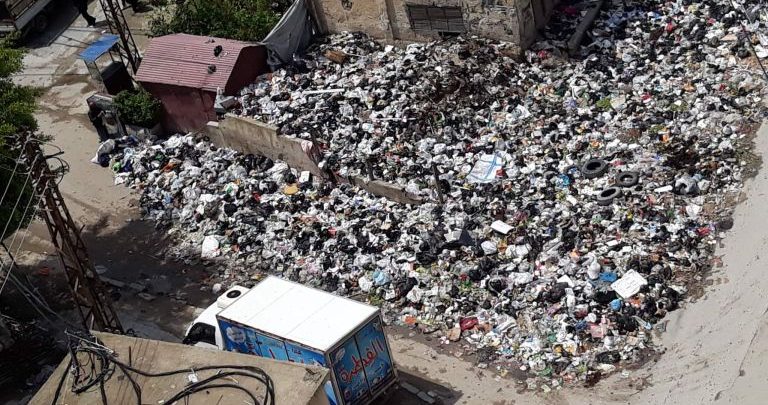The proliferation of trash in the Raml district of Lattakia has led to entire streets being blocked and a paralysis of movement inside the district, as has happened in other neighborhoods that participated in the popular mobilization against the regime in its first days of the revolution.
Residents of this district today are part of a class that are unable to leave for other cities or even to surrounding districts, after revenge actions manifested in the spread of crime and murder in the district, and then lead to repeated raids on the pretext of looking for wanted people, during which all forms of violations were perpetrated—from theft, to kidnapping, to killings and other acts.
Marwan Midani, an engineer who was displaced to the city of Lattakia three years ago and lives near the southern Raml district, said, “the trash, which has led to the spread of diseases in the district, is something the residents have started to live with, and have tried to solve through their simple means, given the municipality’s restrictions on individual solutions and the continuing neglect.” He said that the district had witnessed a new form of the abuse which local authorities—and above them, the militias in Lattakia—had become accustomed to practicing.
Following pressure exerted by authorities after pictures of the trash spread, and complaints from the residents to the Lattakia Governorate, there was some interest in the issue and the trash was removed. Then the neglect returned, with new trash taking the place of the old trash. “The trash removal was something that only happened once,” says a source.
The piles of trash in the district extend to other districts and to the nearby shores, depriving the district of its usual tourist activity, especially given that it had been providing low-cost tourism in light of the rising tourism prices on other parts of the Lattakia coast.
Midani says, “it’s not just revenge against the revolutionary attitudes that had been strongly present in the district, it’s also because this district doesn’t currently have any voice able to defend itself, or any connections. It’s well-known that the clean streets in Lattakia—especially these days—are the ones where influential people live, or people who are able to put pressure on the authorities to provide services to the district. It’s also known that there is a major disparity in the level of services in Lattakia’s districts.”
Innovative measures are not strange to Raml residents. The past few years have seen the regime apply pressure on the districts’ residents by other means, which have displaced many. These start with raids, and theft at the many checkpoints, and then go on to depriving them of all types of services, and then trying to bury the district in trash. This is what the regime wants. It also appears to be part of a project to redraw the city and to change its demographic structure, and to clear out the area that had been part of the revolutionary action that aimed to bring down the system that developed and ensconced the militias in Lattakia ahead of others and many years before the revolution.
This article was translated and edited by The Syrian Observer. Responsibility for the information and views set out in this article lies entirely with the author.


